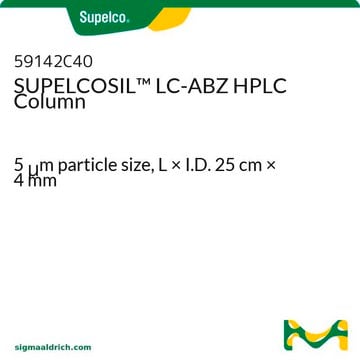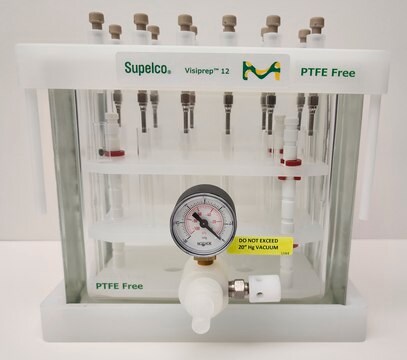59179
SUPELCOSIL™ ABZ+Plus (5 µm) HPLC Columns
L × I.D. 25 cm × 10 mm, HPLC Column
Sign Into View Organizational & Contract Pricing
All Photos(1)
About This Item
UNSPSC Code:
41115700
eCl@ss:
32110501
Recommended Products
product name
SUPELCOSIL™ ABZ+Plus HPLC Column, 5 μm particle size, L × I.D. 25 cm × 10 mm
Agency
suitable for USP L60
feature
endcapped
manufacturer/tradename
SUPELCOSIL™
extent of labeling
12.0% carbon loading
parameter
≤70 °C temp. range
400 bar pressure (5801 psi)
technique(s)
HPLC: suitable
L × I.D.
25 cm × 10 mm
surface area
170 m2/g
surface coverage
surface coverage 3.4 μmol/m2
matrix
silica gel, spherical particle platform
matrix active group
amide, alkyl phase
particle size
5 μm
pore size
120 Å
pH range
2-7.5
application(s)
food and beverages
separation technique
reversed phase
Looking for similar products? Visit Product Comparison Guide
Related Categories
General description
SUPELCOSIL ABZ+Plus columns offer both high deactivation and unique selectivity. Deactivated silica particles of very narrow particle size distribution ensure high efficiency with low back pressure. After bonding and endcapping reactions, the ABZ+Plus phase effectively shields unreacted silanol groups on the silica, preventing them from interacting with most analytes, and provides symmetric peaks regardless of an analyte′s functionality. The phase also allows you to use low ionic strength buffers without having to add an ion-suppressing modifier. ABZ+Plus enables you to use simple mobile phases when analyzing the most difficult compounds; acids, strongly basic compounds, and zwitterions.
suitable for L60 per USP
suitable for L60 per USP
Features and Benefits
• High efficiency for polar, nonpolar, and charged analytes
• Symmetric peaks for the most reactive compounds
• Unique selectivity for polar and charged compounds
• Symmetric peaks for the most reactive compounds
• Unique selectivity for polar and charged compounds
Legal Information
SUPELCOSIL is a trademark of Sigma-Aldrich Co. LLC
Choose from one of the most recent versions:
Already Own This Product?
Find documentation for the products that you have recently purchased in the Document Library.
Customers Also Viewed
Tânia M G Almeida et al.
Chemistry & biodiversity, 2(12), 1691-1700 (2006-12-29)
Absorption, distribution, metabolism, and excretion (ADME) properties are of invaluable importance to a bioactive compound. Permeation process is one of the most widely studied by many different techniques. Among them, reversed-phase liquid chromatography (RP-LC) is proving to be of great
Zhongping John Lin et al.
Journal of pharmaceutical and biomedical analysis, 37(4), 757-762 (2005-03-31)
A highly sensitive method was developed and validated for determining the free fraction of flunarizine in human plasma. Equilibrium dialysis was used for the separation of free (unbound) drug and liquid chromatography/tandem mass spectrometry (LC-MS/MS) was used for quantitation. Post-dialysis
W Pan et al.
Journal of chromatography. B, Biomedical sciences and applications, 703(1-2), 129-138 (1998-02-03)
A sensitive, specific and precise HPLC-UV assay was developed to quantitate cocaine (COC) and its metabolites benzoylecgonine (BE), norcocaine (NC) and cocaethylene (CE) in rat plasma. After adding 50 microl of the internal standard solution (bupivacaine, 8 microg/ml) and 500
C Ceniceros et al.
Journal of chromatography. B, Biomedical sciences and applications, 705(1), 97-103 (1998-03-14)
A rapid and simple high-performance liquid chromatographic (HPLC) method with amperometric detection has been developed for the quantitation of labetalol in urine. The chromatography was performed at 30 degrees C using a reversed-phase column with a base deactivated silica stationary
Nasser E Bastani et al.
Rapid communications in mass spectrometry : RCM, 23(18), 2885-2890 (2009-08-12)
F2-isoprostanes are a family of prostaglandin F2-like compounds that are formed by free-radical-catalyzed peroxidation of arachidonic acid. Several F2-isoprostanes, but in particular 8-epi PGF(2alpha), are widely used as oxidative stress biomarkers. An analytical method based on liquid chromatography with negative
Our team of scientists has experience in all areas of research including Life Science, Material Science, Chemical Synthesis, Chromatography, Analytical and many others.
Contact Technical Service



